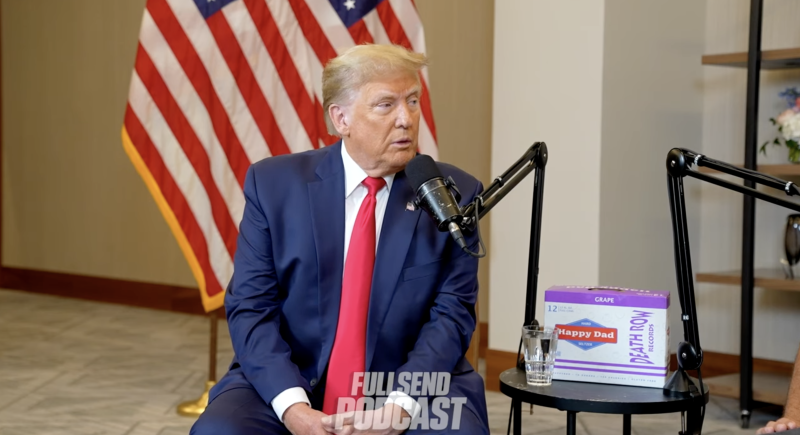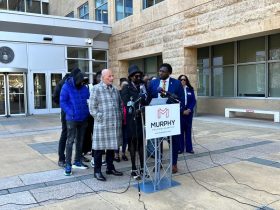For Americans of a certain age, the idea of a former president helping to promote Death Row Records would seem hard to fathom. Thirty years ago, the music label was the scourge of politicians, reflecting an embrace of the gangs-and-drugs subculture that had helped propel violent crime to historic highs. But time and nostalgia work wonders. Death Row artists provided the entertainment for the Super Bowl halftime show in 2022. And now the label’s brand name and logo are available for marketing deals.
On hard seltzer, for example. So there was former president Donald Trump — famously a teetotaler because of his older brother’s alcohol-related death — sitting next to a carefully placed box of Death Row Records/Happy Dad seltzer for an interview on the “Full Send” podcast. Even if he found the setup distasteful, what’s Trump going to do, fault Death Row for licensing out its name?
But Trump wasn’t there to opine on the evolutions of pop culture. He was there instead to continue to strengthen the relationship between right-wing politics and the machismo-soaked subculture of young men to which the podcast appeals. If there’s a bright spot among young Americans for Trump’s politics, that’s it.
This was Trump’s second time on the podcast, hosted by YouTube personalities who call themselves the Nelk Boys. He was on a year ago, as well, at which point his unfounded claims about voter fraud resulted in the episode being removed from YouTube for violating its prohibitions on misinformation. In the year since, the podcast has hosted other prominent right-wing voices, including Elon Musk and Andrew Tate, the misogynistic influencer now awaiting trial in Romania on charges of human trafficking. (YouTube took the latter down for violating its policies on hate speech.)
The Nelk Boys’ shtick has for a long time been pushing boundaries, with their fame originating largely from uploading videos of various pranks. They sparked outcry during the pandemic for continuing to travel and host parties and events despite restrictions put in place to limit the spread of the virus. But in their new conversation with Trump, YouTube’s removal of the first one wasn’t simply the equal-and-opposite response from pushing on the limits. Instead, it was a sign of a crumbling America.
At one point, host Kyle Forgeard, in keeping with the pro-Trump right’s isolationism, prompted Trump to explain why Taiwan held strategic importance for the United States. Trump at first riffed on the island’s production of computer chips before suggesting that maybe it wasn’t that much of a priority, particularly given the amount of investment America has made in the war in Ukraine.
“Now on top of it we’re supposed to go 9,000 miles away,” Trump said. “You know, we’re 9,000 miles away from, as you know, from Taiwan, 9,000. And [China is] 90 miles away. That’s just little difference.”
“With that being said, we want to help people out. We want to have freedom,” he continued. “But, you know, in many ways, we’re no longer a democracy. When you look at what’s happening … they’ve weaponized our justice system. They’ve done things that were unthinkable. I say we don’t have a free press. Look what happened to our show the last time we did a show. You had the biggest show. You had the biggest hits. You were setting records and they took you down.”
This chain of logic is not an uncommon one. Someone — a teacher, a boss, a company, the state — sets limits within a certain context. Those limits are then framed as contrasting unfavorably with the freedoms Americans enjoy. So those implementing the limits are depicted as enemies of freedom or a free America. Ergo, America is under threat.
The irony here is Trump’s claiming that the country is “no longer a democracy.” He said it again later in the show, too.
“I said we no longer have a democracy, and I say we don’t have free speech,” he said in response to another incident in which content was removed from YouTube. “That’s an incredible form of not having free speech. They took him down for what, because he likes Trump?”
Remember: the reason the first interview was taken down was that Trump, with the Nelk Boys’ assistance, was undermining confidence in democracy. There’s no evidence at all that the 2020 election was affected by voter fraud to any significant degree, but because Trump lost, he’s insisting that his allies claim there was. The Nelk Boys were more than once happy to provide him an unchallenged platform to do so.
After all, Trump, like Death Row Records, has a brand they find appealing: the cynical tough guy. He’s someone who thinks it’s cool to prod the establishment and to celebrate machismo even when it tips over into misogyny. Trump was the proto-influencer, telling people how to get rich and establishing a lifestyle to which they could aspire. And now here he is giving the Nelk Boys his blessing — and telling their audience of young men that democracy is eroding.
Young men — and particularly young White men — are one of the few bright spots for the Republican Party. Younger Americans are mostly not White men, but that group has been more likely than young people overall or White women to identify as Republican or Republican-leaning independent.
Notice that the same group — White men under 40 — was also more heavily Republican during the Ronald Reagan-era in the 1980s. But that was a very different Republican Party with a very different power structure and very different desired outcomes.
This “democracy is failing” argument is particularly stark coming from Trump — the guy who stoked a violent assault on the Capitol on Jan. 6, 2021 — and to this audience. In 2017, the World Values Survey asked Americans (and people around the world) if it would be good to have a leader that was able to act outside of the constraints of elections or a legislative body.
Among Republican-leaning men under the age of 50, most said such a form of government would be “very” or “fairly” good.
That Trump’s rhetoric was otherwise confused and confusing doesn’t really matter. (A snippet of last year’s interview in which he made weird claims about wind turbines went viral; he said basically the same stuff this year.) It was his presence as an anti-establishment, pro-dude figure that was important.
All the while, he was sitting there next to that seltzer box labeled “Death Row Records.” If anything, it’s a bit of consolation: Things that seem at one point like violent threats to the country may, over time, just become nice little callbacks to how things used to be.








